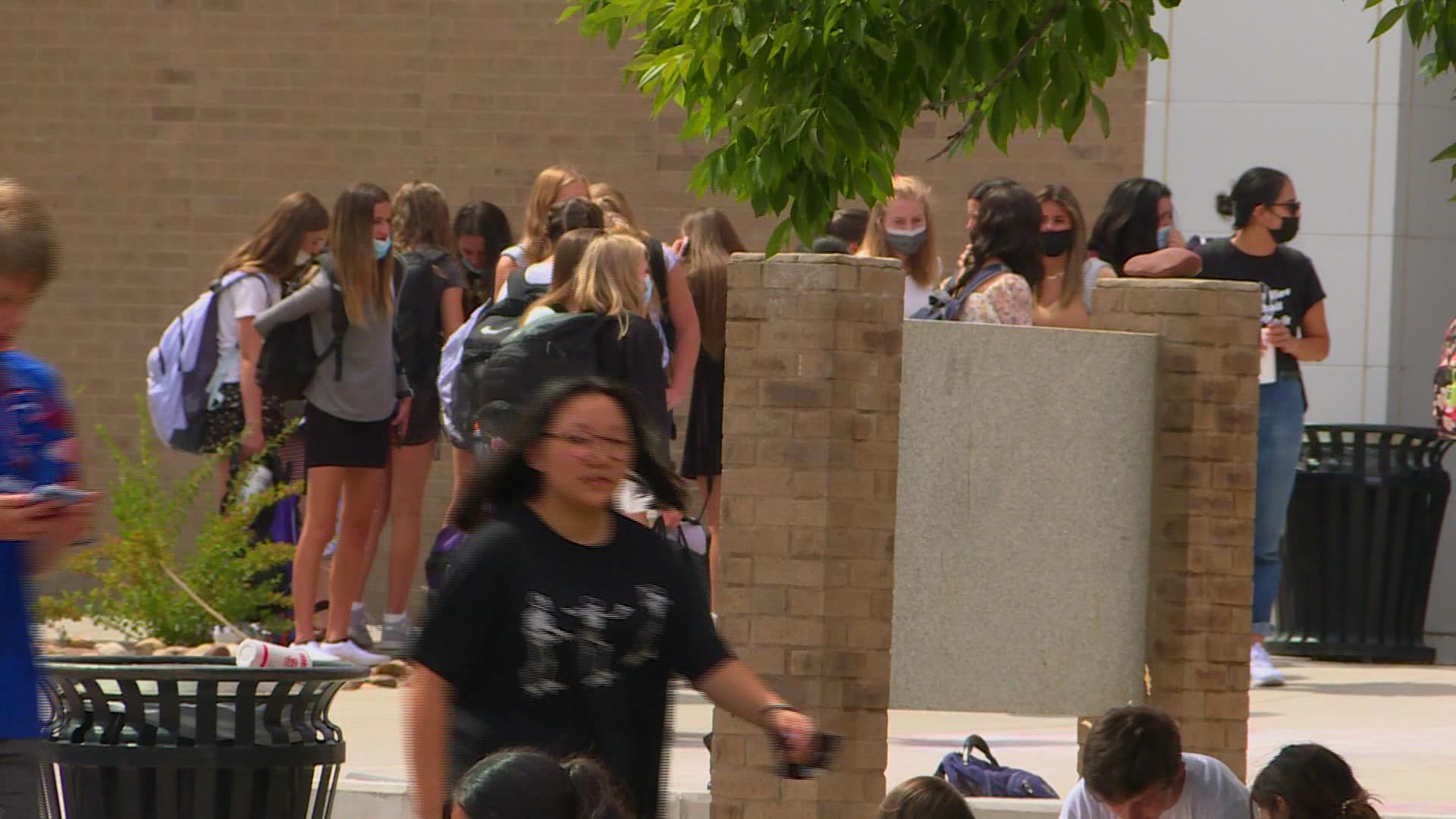DENVER — A total of 80 Colorado schools have active COVID-19 outbreaks as of Wednesday, according to the latest data released by the Colorado Department of Public Health and Environment (CDPHE).
The outbreaks represent a total of 886 cases, 86% of which have been students.
The number of K-12 outbreaks nearly doubled from the previous week, when 42 were reported.
The total number of cases more than doubled from week to week, from 401 total cases last week.
The total number of student cases also more than doubled, from 354 cases last week to 760 cases this week.
CDPHE defines an outbreak as five or more cases in a 14-day period, except in residential health care and correctional facilities.
Amie Baca Oehlert, President of the Colorado Education Association, said the number of outbreaks in schools is concerning and speaks to the importance of keeping mitigation efforts in place.
"I think there’s a very big worry that we could quickly or soon get back to a remote learning environment," she said.
Baca Oehlert said the health and safety of students and educators remains a top priority, but the goal this year is also to keep students in the classroom as much as possible.
Friday, CDPHE updated its guidance on COVID-19 safety measures from K-12 schools. The state health department now recommends local public health agencies and school districts mandate masks for everyone stepping into school buildings, regardless of vaccination status.
The decision to mandate masks still lies in the hands of individual local health departments and school districts.
"It would be nice to see some level of consistency across the state and across districts," Baca Oehlert said.
Currently, some districts require students and staff wear masks, while others only recommend it.
"We are hoping that there is greater consistency around what is needed to maintain that in-person learning," Baca Oehlert said.
RELATED: Latest COVID-19 numbers: Case count, positivity appearing to level as hospitalizations keep climbing
Dr. Hara Levy, a pulmonologist with National Jewish Health, agrees more consistent guidance could keep students and educators in the classroom safer and avoid having to transition to remote learning.
"If they want kids in school, then they need to vaccinate and wear a mask, basically," Levy said.
COVID-19 cases in children have increased since schools reopened this fall.
Levy said the two main differences between this year and last year when it comes to COVID-19 infections in students are that they are back in the classroom, and the more contagious Delta variant continues to spread.
"It wasn’t that (kids) weren’t affected," she said. "They had some risk mitigation that changed over time."
In spring 2020, students were learning at home. In the summer, many spent time outdoors, where the virus spreads less. In the fall of 2020, many still had not returned to their classrooms.
"In the winter when things opened up again and they were going back to school, and they weren’t vaccinated and they were exposed, that is when we saw the increase in the cases," Levy said.
Levy said most of the patients she treats for COVID-19 are 12 to 17 years old, and usually have mild symptoms, but some develop "long-hauler syndrome."
"What we’re seeing are kids who are lethargic, unable to focus, they stay to themselves, they have brain fog, and they're short of breath," she said.
National Jewish Health now has a Pediatric COVID-19 Assessment Clinic where they treat kids who are dealing with long-term side effects from the virus.
Levy said it is possible for kids and educators to remain learning in person as long as there are proper mitigation measures, such as mask wearing, social distancing, and handwashing, in place.
"If they want kids in school, then they need to vaccinate and wear a mask basically," she said.
No deaths connected to school outbreaks have been reported.
The largest active school outbreaks are at Douglas County High School and Power Technical Early College in Colorado Springs, which each have 34 total cases.
There are 11 active K-12 outbreaks with at least 20 cases.
The largest outbreak last week was at STEM School Highlands Ranch, which had 30 cases. That outbreak did not grow this week.
Here's a look at the active outbreaks at K-12 schools as of Wednesday:
The numbers are cumulative, meaning if a school has a certain number of cases, that doesn't mean all those people were sick at once. For an outbreak to be resolved, 28 days must pass with no new illnesses.
As the school year was wrapping up last May, the state reported more than 250 active outbreaks in K-12 schools.
This school year, the state is not requiring most Colorado classrooms to quarantine after a positive COVID-19 exposure. However, local health departments can set stricter mitigation and quarantine procedures.
Zack Newman, investigative data producer for 9Wants to Know, contributed to this report.
SUGGESTED VIDEOS: COVID-19 Coronavirus
MORE WAYS TO GET 9NEWS
Subscribe to our daily 9NEWSLETTER
Download the 9NEWS APP
iTunes: http://on9news.tv/itunes
Google Play: http://on9news.tv/1lWnC5n
HOW TO ADD THE 9NEWS APP TO YOUR STREAMING DEVICE
ROKU: add the channel from the ROKU store or by searching for KUSA.
For both Apple TV and Fire TV, search for "9news" to find the free app to add to your account. Another option for Fire TV is to have the app delivered directly to your Fire TV through Amazon.

